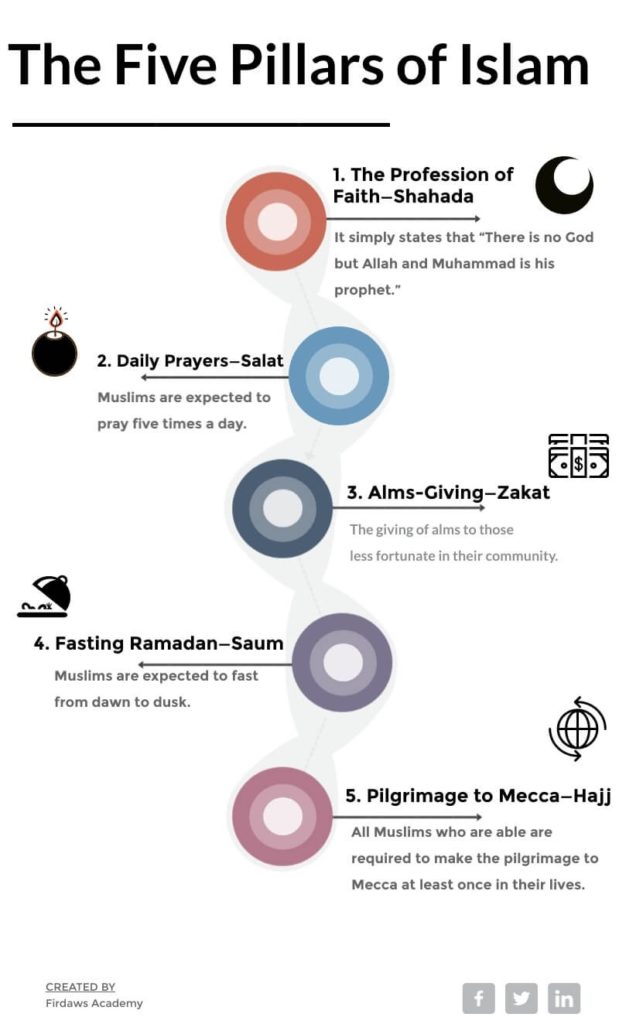
The fourth pillar of Islam
4. Fasting during Ramadan—Saum
- In memory of the revelation of the Qur’an.
- During month of Ramadan, daylight hours.
- Those who have medical exemptions etc. should fast at another time.
- ‘Id al-Fitr, Feast of Fast-breaking: at beginning of next month.
Fasting: Fasting is obligatory upon every sane, post-pubescent Muslim, capable
of fasting the month of Ramadan – other than the women experiencing them
monthly menses or post-partum bleeding. Able children should be ordered to fast in order to become accustomed to its practice.
The time of Ramadan’s commencement is known by one of two signs:
1) Sighting the new moon by a trustworthy Muslim, male or female;
2) Completing of thirty days of the month of Sha’ ban.
The time of the obligatory fast 1s from Fajr until Maghrib. The person has the
intention to fast before Fajr.
The Nullifiers of the Fast: The fast is nullified by the following:
1) Sexual
intercourse in the vagina. One must make up that day and expiate the sin of this act by
freeing a slave, and if he cannot do that, he must fast two consecutive months. If he is
not able to either of those, he must feed sixty poor people, and for those that cannot do
even this, nothing is due;
2) Ejaculation due to kissing, hugging or masturbation, etc.
There is nothing due for a person who has a wet dream;
3) Eating or drinking
something intentionally. If someone does so forgetting that he is fasting, the fast
remains correct (and he continues the fast till sunset);
4) Letting blood, by means such
as cupping or blood donation. A little amount for a medical examination and
unintentional bleeding, like a wound, does not nullify the fast;
5) Intentional vomiting;
Fasting is not nullified by the following:
* Dust entering one’s throat; *
Water unintentionally comes to one’s throat while washing his mouth; #*
Ejaculation due to thinking about desire; # Wet dreams; #* Unintentional bleeding;
* Unintentional vomiting;
If someone eats thinking that it is night and then it becomes clear that it is the day,
he must make up for that day. If he eats doubting about the coming of the dawn,
thinking that it is still nighttime, his fast is still valid, but if he eats not certain about
the setting of the sun, and it happens to still be daytime, he must make up for that day.
Those Allowed not to Fast:
# It is prohibited for a person to not fast unless he
has a legitimate excuse. * Women in their monthly menses and postpartum
bleeding must break the fast. # When saving someone’s life is conditional on
breaking a person’s fast, it is obligatory upon that person to break his fast. # It is
Sunnah for the traveler to break his fast if the journey is long enough to allow
shortened prayers and if fasting is difficult for him. * It is also Sunnah for a sick
person not to fast if he fears that fasting might cause him harm. * It is allowed to
break the fast for a resident who intends to travel in the day. # It is allowed for a
woman who is pregnant or nursing to break the fast if she fears any harm on the
child or herself. #* All types of people mentioned above must make up the days
missed. The pregnant or nursing woman should additionally feed a poor person for
every day missed if she breaks her fast because she fears harm for the child only. *
If a person breaks his fast because of aging or because of a chronic disease from
which it is not expected that he will recover, then he must feed a needy person for
every day of Ramadan, and he does not have to make up those days.
#* Whoever postpones making up the days he missed until the next Ramadan due to a legitimate excuse, only needs to make them up.
If his postponement was not for a legitimate excuse, then he must make up the missed days in addition to feeding a needy person
for each day he did not make up. * If a person dies without making up some
missed days due to some genuine excuse, then there is no sin on him and no making up is required.
If there was no legitimate excuse, a needy person must be fed for each day missed and it is desired that someone from his relatives fast in lieu of him
for what he neglected of the fast of Ramadan or the fast of a vow. All vows to Allah
that do not entail disobedience to Allah should be fulfilled. If a person does not
fast for a legitimate reason and then this reason lapses during the day of fast,
similarly, if a non-muslim accepts Islam, a woman becomes clean from her menses,
a sick person 1s cured, a traveler returns from the journey, a child reaches puberty,
or the temporarily insane person regains his sanity, all of these people must make
up the fast of that day in the midst of which this happened, even if they fasted for
the remaining portion of that day. # No one may fast in lieu of another who is
excused from fasting Ramadan.
Voluntary Fasts:
* The best voluntary fast is to fast every other day. # The second best fast is to fast every Monday and Thursday. # The next in line is to fast
three days of every month, during the days of the full moon, the 13″, 14 and 15™ [of
the Islamic lunar month]. * It is from the Sunnah to fast most of the month of
Muharram and Sha’ban. * It is also Sunnah to fast the day of Ashooraa (10″ of
Muharram), the day of Arafat (9″ of Dhul-Hijjah) and six days of Shawwaal. ¥* It is
disliked to single out the month of Rajab, Fridays, Saturdays, or the day of doubt (the
thirtieth day of Sha’ban) for fasting. #* It is prohibited to fast the day of Eid-al-Fitr or
Eid-al-Adha. It is also prohibited to fast the days of Tashreeg (11, 12″ and 13″ of
Dhul-Hijjah), except for the person who must compensate for not slaughtering in making the Hajj-at-Tamattu’ or Qiran (see pilgrimage – Hajj).
Notes:
* It is allowed for the person in the state of major impurity, like a person who has
had sexual intercourse or a woman in menses or postpartum bleeding who becomes
clean before the crack of dawn, to postpone his bath until after dawn [yet before
sunrise]. He may also take his predawn meal before his bath. This does not harm his fast.
# It is allowed for a woman to take medicine to postpone her menses if she
intends by this to participate with the Muslims in the fast of Ramadan, on the
condition that this does not harm her in any way. * It is allowed for the fasting
person to swallow saliva and mucous if it is within his mouth. # The Prophet (25)
said, “My nation will remain on goodness as long as they hasten to break the fast
and take their pre-dawn meals at their latest time.” (Anmad). ** He (25) also said,
“The religion will continue to prevail as long as people hasten to break the fast,
because the Jews and Christians delay in doing so.” (Abu Dawud). * It is a loved act
that one makes a supplication when breaking his fast, since the Prophet (#24) said,
“The fasting person, at the time of his breaking the fast, has a supplication that will
not be rejected.” (Ibn Majah). One of the invocations reported is to say as the Prophet
(#2) said, “Dhahab ad-dhama’u wabtallit-il-uroog wa thabat-al-Ajru insha-Allah”’
(Abu Dawud). (the thirst has disappeared, and the veins are nourished, and the reward 1s
confirmed, by the will of Allah).
# It is from the Sunnah to breakfast with fresh
dates. If fresh dates are not available, then dry dates should be eaten. If neither of those two is available, he should break his fast with water. # The fasting person
should avoid Kuhl (a kind of eye powder), eye drops and eardrops in order to avoid
the matters concerning which the scholars have differed. If a person is in medical
need of such drops, then there is no harm, even if he feels the drops in his throat.
# It is from the Sunnah to use the Siwak at all the times of the fast. There is no time in
which it is disliked according to the correct judgment of the scholars of jurisprudence.
* The fasting person must avoid all backbiting, hate-mongering,
falsehood, etc. If someone abuses the fasting person or curses him, he should say, “I am fasting,” and guard his tongue and limbs from all that which is sinful concerning
his fast. The Prophet (#:) said, “For he who does not leave off saying falsehood
and acting upon it, Allah has no need for him to leave his food and drink.” (al-
Bukhari and Ahmad) * It is from the Sunnah for a fasting person who is invited to a
meal to supplicate for the host and to partake in breakfast, even if he is not fasting.
* The Honored Night (Lailat-ul-Qadr) is the best night of the year. It falls in one of
the last ten nights of Ramadan. The most emphasized is the twenty-seventh night.
The performance of good deeds on this night is better than in a thousand months (about 83 years).
* This night has visible signs, of which are a whitish dawn
without much brightness of the Sun, and also mild weather.
# A Muslim may pass
by it without knowing it. One should perform as much worship as possible in
Ramadan and especially in the last ten nights, seeking not to miss standing for
prayers in any of these nights. If he stands in prayer with the Imam for Salat-ut- Taraweeh, he should not leave until the Imam completes the Taraweeh so that the
whole night of his is written for him. #It is Sunnah for the person who begins a
voluntary fast to complete it, but it is not obligatory. If he intentionally breaks his
fast, then there is no need to make that fast up as compensation.
Devotion (I’tikaaf):
I’ tikaaf means to remain in the Mosque (Masjid) in order to perform worship.
The condition is that he should not be in a state of major impurity and should not
go outside the Masjid except for that which is absolutely necessary, like eating,
going to the bathroom or making an obligatory Ghusl.
Itikaaf is void if one goes outside the Masjid without true need or if one has
sexual intercourse. /’tikaaf can be done any time of the year but it 1s recommended
in Ramadan, especially the last ten days.
The least amount for I’tikaaf is any set period of time, yet it is better that it lasts
for no less than a day and night. A woman should not perform I’tikaaf except with
the permission of her husband.
The Sunnah is to increase one’s worship of Allah and to avoid indulging in usual
permissible acts, avoiding all things that do not concern the person.
For explaining the first pillar of Islam (Shahadah) Please, click here
For explaining the second pillar of Islam (Prayer) Please, click here
For explaining the Third pillar of Islam (Charity) Please, click here
For explaining the fourth pillar of Islam (Fasting) Please, click here
For explaining the fifth pillar of Islam (Pilgrimage) Please, click here


Hi, very nice website, cheers!
——————————————————
Need cheap and reliable hosting? Our shared plans start at $10 for an year and VPS plans for $6/Mo.
——————————————————
Check here: https://www.good-webhosting.com/